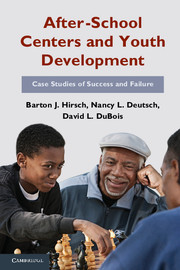Book contents
- Frontmatter
- Contents
- Figure and Tables
- Preface
- Introduction
- Midwest Center
- North River Center
- West River Center
- 10 The Jewel in the Crown
- 11 Midnight: A Teen Father Stays the Course
- 12 Tommiana: A Contest between Closeness and Competition
- 13 Putting It All Together: What Have We Learned?
- Conclusion
- Appendix Data Sources
- References
- Index
11 - Midnight: A Teen Father Stays the Course
Published online by Cambridge University Press: 05 June 2012
- Frontmatter
- Contents
- Figure and Tables
- Preface
- Introduction
- Midwest Center
- North River Center
- West River Center
- 10 The Jewel in the Crown
- 11 Midnight: A Teen Father Stays the Course
- 12 Tommiana: A Contest between Closeness and Competition
- 13 Putting It All Together: What Have We Learned?
- Conclusion
- Appendix Data Sources
- References
- Index
Summary
It might come as a surprise to many observers to find a youth such as Midnight frequenting a comprehensive after-school center. As a seventeen-year-old, this African-American young man is well beyond the age when most youth stop making a habit of attending after-school programs. Nor, as a teen father, does he fit the profile of avoidance of risk behavior that might be expected of older youth who do remain engaged in after-school centers. Coupled with the challenges of parenthood, Midnight has struggled academically and at one point been expelled from school for truancy. The risky and illegal behaviors that are modeled by many of his peers, furthermore, clearly would make it easy for him to gravitate toward a more dangerous life on the streets. How is it, then, that Midnight has ended up being such a reliable presence at the West River center and an enthusiastic participant in several programs there? This puzzle is made all the more intriguing by the fact that he must travel by bus forty-five minutes to get to the center each day. As we shall see, Midnight’s story offers a potent example of how after-school centers can benefit older teens, even those who already have experienced significant setbacks and thus may be passed over by programs with a focus on prevention. His year at West River is remarkable, too, as a demonstration of how a lack of support tailored to the individual needs of youth, in Midnight’s case his academic difficulties, can be a formidable weakness of after-school centers.
- Type
- Chapter
- Information
- After-School Centers and Youth DevelopmentCase Studies of Success and Failure, pp. 234 - 258Publisher: Cambridge University PressPrint publication year: 2011



